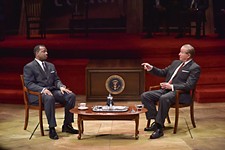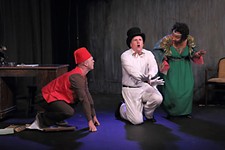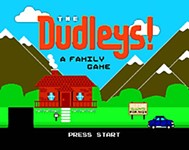The Dream
This rock & roll take on the Bard aims for spectacle more than meaning or heart
Reviewed by Avimaan Syam, Fri., May 14, 2010
The Dream
Beverly S. Sheffield Zilker Hillside Theater, 2206 William Barton Dr., www.austinshakespeare.org
Through May 30
Running time: 2 hr., 10 min.
Free love. Social revolution. Breaking down the outdated barriers of one's country. Being in or out of "the scene." Women's rights. There are plenty of reasons for setting A Midsummer Night's Dream in the 1960s before we even touch on the
psychedelic insinuations of fairy wars and alternate universes. Watching Austin Shakespeare's The Dream at Zilker Park, it seems the main reasons are the inclusion of rock music and Sixties fare for costumes.
Far be it from me to restrict Shakespeare's work to his time period. I've seen more Bottoms wear overalls than I have pumpkin pants; I've seen the Bard's work set anywhere from modern-day India to colonial South America to Xanadu. But the point of setting a play in a given period – at least to me – is to give new insight into the work or cast light on a certain theme of the play or bring questions to that time period.
A Midsummer Night's Dream is one of Shakespeare's most popular and most performed works. It's an ensemble comedy including a quartet of young, desperate lovers; a gaggle of workingmen-cum-actors, the Rude Mechanicals; and a fairy world divided by feuding rulers, Titania and Oberon. It's sweet and short and magical and full of madcap, wonderful moments.
Clearly a large deal of Austin Shakespeare's focus was imbrued into the music, co-composed by Cesar Osorio and the ubiquitous Michael McKelvey. The music is good, fun, and well-performed – the stage and the actors perk up when a musical interlude comes around. Many of the production's innovative moments come from the live rock band's inclusion, such as the echoing electric guitar slide whenever love-in-idleness is applied to one of the lovers.
Conversely, the actors seem to be aware that the musical set-pieces take precedence (certainly keeping with Midsummer's sing-song verse doesn't), and the actual dialogue is full of a lot of air and pauses. Other than an earnest energy seen in the lady lovers, Gwendolyn Kelso and Jenny Larson, and the excellent Alejandro McDonald-Villarreal as Puck, most of the dialogue delivered is flat and tired. During dance numbers, the cast swirls across the massive set; during Act III, the Rude Mechanicals are lined up in a 10-foot patch of stage. Why can't this energy and choreography be distributed evenly?
This is theatre that is aimed at a much lower common denominator. On the one hand, that's great. Shakespeare would love that; there are more than enough crass and raunchy jokes in his plays to suggest his work was never intended to reside in the dusty halls of academia. Shakespeare is (and should be) for the Falstaffs as much as for the Prince Hals.
But what Shakespeare also did more than any of his contemporaries – and indeed more than most writers in history – is attempt to fill each scene and each character with humanity. With heart. With meaning. Director Ann Ciccolella's production aims for spectacle rather than meaning or feeling or heart. This is why the two biggest bouts of applause came for William Moses' Oberon digging into a note and a nontextual rock dance by the fairies toward the end of the play, punctuated by Puck playing air guitar on a broom.
I'm glad that Austin Shakespeare is able to bring the Bard to so many Austinites through the Shakespeare in the Park series. I just wish it did so through his language and through our hearts instead of the "weak and idle theme" that Robin Goodfellow warns us of.











